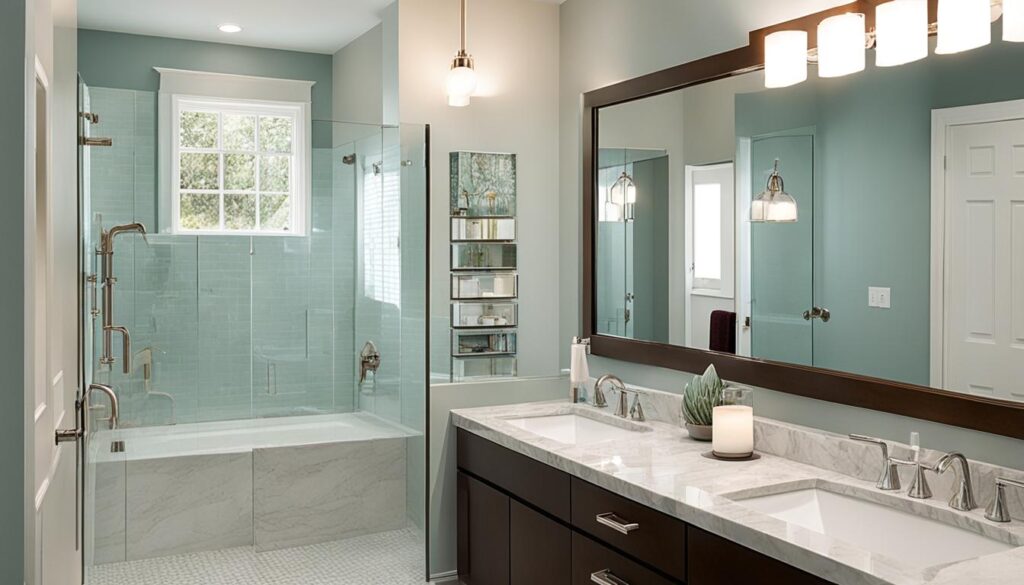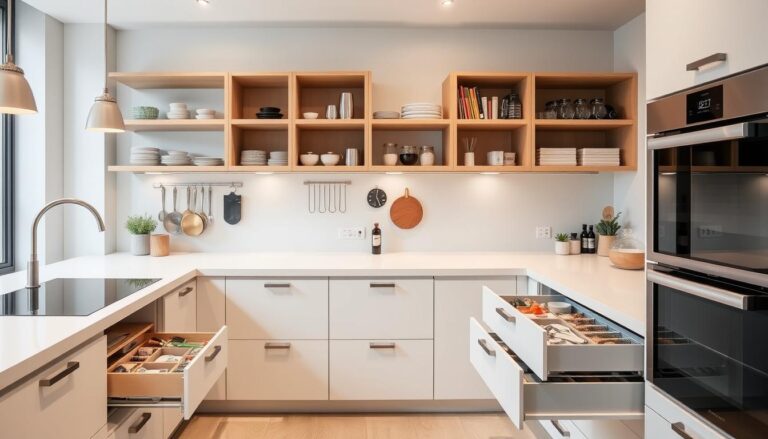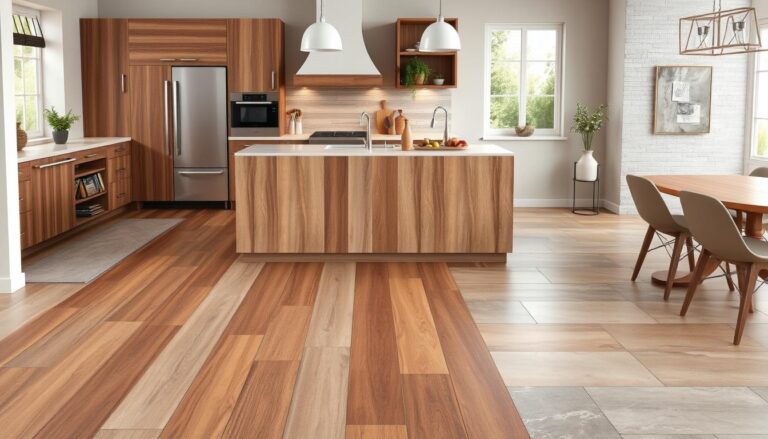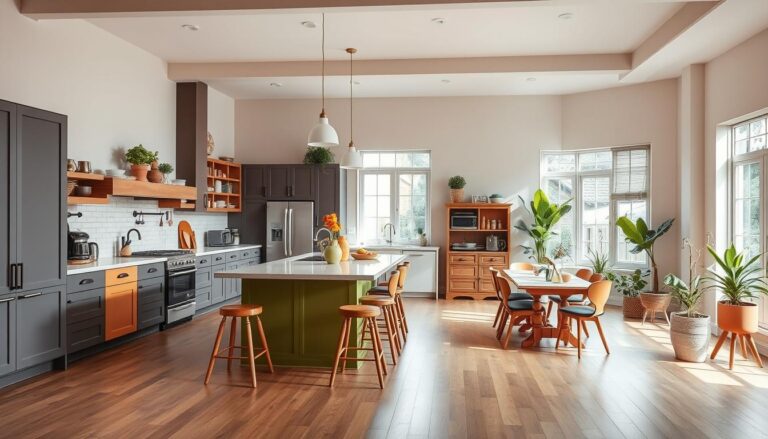Ever thought about how a DIY bathroom remodel could change your space and save money? Many owners think big renovations cost a lot. But, a smart bathroom makeover can refresh your home’s vital area without breaking the bank. With careful planning and useful bathroom renovation tips, you can get great results affordably.
We will share easy makeover ideas and steps to help you. You’ll learn about costs, time needed, and the tools required. Starting a bathroom remodel can boost both the look and comfort of your space1. Whether you’re just painting or doing a full makeover, the joy of enhancing this space is rewarding.
Get ready to dive into the exciting DIY bathroom remodel world!
Key Takeaways
- A DIY bathroom remodel can effectively save homeowners thousands of dollars whilst enhancing the space.
- Planning is crucial for budget management and timely project completion.
- Choosing simple materials and methods can lead to significant cost savings.
- Employ essential tools and techniques to simplify the remodeling process.
- Proper ventilation and the right paint choices are key for a successful renovation.
Introduction to DIY Bathroom Remodeling
Embarking on DIY bathroom renovation projects can make your space better and more beautiful. These updates improve how you use your bathroom daily and increase your home’s value. Before starting, think about what you want to achieve, like a full makeover or small updates.
Start by checking what needs to be fixed or changed. Make a list of things you’ll need such as tiles, paint, bathroom fixtures, vanities, and faucets2. Also, gather the right tools like a drill, a saw, and clamps2.
Know that renovations often cost more than expected. For instance, one project went $39 over a $600 budget3. With good planning and attention to detail, you can make your bathroom look great.
Be ready for removing old items, fixing walls, and setting up new pieces. A planned approach makes remodeling easier and ensures your bathroom looks modern.
Planning Your DIY Bathroom Remodel
Planning your DIY bathroom remodel is key. You must set a budget that’s realistic for you. Then, work out how long the project will take. This helps keep everything on time and on budget.
Setting Your Budget
Figuring out your budget is a big step. On average, redoing a bathroom costs about $125 per square foot4. You’ll need to think about the cost of materials, paying workers, and any surprises. Smaller updates may cost between $200 and $5,000. But, a full small remodel might cost $5,000 to $15,0004. It’s smart to save some money for special upgrades. Even in a small space, things like heated floors make it more comfy and add value5.
Establishing a Timeline
Having a realistic timeline is crucial. Planning can take months, and some projects need up to six months. This depends on how complex your remodel is. The time you’ll need can also be affected by how quickly you can get materials and pass inspections6.
Divide your project into stages. Make sure plumbing gets a green light before you start on walls6. By managing your time well, you can make the remodel run smoother and finish faster.
| Budget Range | Project Type |
|---|---|
| $200 – $5,000 | Minor Bathroom Refresh |
| $5,000 – $15,000 | Small Bathroom Remodel |
| Over $15,000 | Major Bathroom Remodel |
Establishing a reasonable budget and timeline is crucial for a bathroom renovation project.
Choosing the Right Design
Choosing the right design for your bathroom is key. It should be both practical and pretty. Consider every detail, from colors to design touches. Nearly 76% of people plan carefully before starting to remodel their bathroom7. This prep work leads to lots of choices. But, 82% start with a rough idea of cost7.
Picking a Color Scheme
Your choice of colors sets the mood. Neutrals are in for a sleek look, and brights bring energy. Many go for up to three types of tiles, aiming for an easy, yet stylish look8. With 88% factoring in sunlight, pick shades that make your space bright and open7.
Design Elements to Consider
Think about key things like fixtures, lights, and where to store stuff. About 63% tweak the layout to work better7. A whopping 70% have a list including materials and what they’ll pay the contractor7. Try clever tricks like wall-mounted features to use space wisely9. Stick to two types of metal finishes to keep things looking unified, as 45% recommend8.
| Design Element | Consideration Percentage |
|---|---|
| Homeowners engaging in detailed planning | 76% |
| Projects considering natural light | 88% |
| Projects requiring layout adjustments | 63% |
| Homeowners preferring three tiles | Percentage not specified (but noted for simplicity) |
| Recommended number of metal finishes | Two finishes for coherence |
Using these smart ideas for a bathroom makeover boosts your space’s look. It also helps you stay on budget and reflect your style879.
DIY Bathroom Remodel: Essential Tools and Supplies
Starting a DIY bathroom remodel needs the right tools and supplies for a smooth process. It’s important to have both essential and additional tools for a successful makeover. Here’s a list of what you need before you start your project.
Basic Tools You Need
- Tape Measure: For precise measurements of your space and materials.
- Drill: Essential for hanging fixtures and putting together cabinets.
- Safety Gear: Includes gloves, goggles, and masks for your protection.
- Level: To make sure everything fits perfectly in place.
- Utility Knife: Needed for cutting different materials.
Optional Tools That Make Work Easier
Some tools aren’t necessary but can make the job easier and improve your work:
- Cordless Drill: Lets you work freely without being stuck to an outlet.
- Wet-Dry Vacuum: Perfect for clean-ups, keeping your work area tidy.
- Paint Sprayer: Gives a smooth paint finish to walls and trim.
- Tile Cutter: For easy and precise tile cutting, reducing manual effort.
Many tools can be rented from local home improvement stores to reduce initial costs. This is helpful for DIY bathroom projects where you need top-notch tools for great results10.
Demolition Phase: Preparing for Your Remodel
The demolition phase is key for any DIY project, especially in bathroom renovations. Getting ready and staying safe are musts for a good outcome. Here, we’ll cover safety tips, how to take out old items, and how to handle waste well.
Safety Precautions to Follow
Before starting the tear-down, safety comes first. Make sure to turn off the water and power in the bathroom. To do this, turn off the power at the breaker and shut off the water using a main valve or fixture valves11. Wear the right safety gear like gloves, goggles, and masks to keep dust and debris away. Don’t forget heavy-duty bags for getting rid of trash during the job12.
Steps to Remove Old Fixtures
Removing old fixtures doesn’t have to break the bank. First, clear out anything that’s yours from the area. Then you:
- Take out stuff like shower curtains and trash bins.
- Remove trim work and stuff on walls, like mirrors.
- Unhook the toilet using wrenches and a knife11.
- Take out the vanity and sink.
- Get rid of old tiles. Use a drill for concrete floors or a hammer for wall tiles12.
After removing tiles, check if the floor is even and clean up any dust. If you find mold, you might need to throw out old insulation.
How to Manage Waste Effectively
Good waste management keeps your renovation site clean. Renting a dumpster online makes it easy to toss debris any time, day or night11. Take regular trips to the dumpster to keep things neat. A Shop-Vac helps control dust. Use strong bags for small bits of tile and such to handle waste better12.
Plumbing Considerations in Your Remodel
When you start a DIY bathroom remodel, knowing your plumbing is key. It helps you make smart choices, especially with small bathrooms. Getting to know your current plumbing setup is the first step to a good redesign.
Understanding Your Existing Plumbing
Your current plumbing affects how well your remodel will turn out. It’s important to learn about your pipes and their locations. If your plumbing is old, switching to PEX piping is a smart move, according to experts13. Also, using water-saving fixtures like modern toilets and showers can cut your water bill14.
Tips for Rerouting Pipes
Changing your pipes can be tough but sometimes it’s needed for the perfect layout. Moving things like sinks and tubs often requires help from professionals13. Also, if you’re adding things that use a lot of water, check if your water heater can handle it. You might need a bigger one or a tankless heater for better efficiency14. Don’t forget about good ventilation to avoid mold and mildew in your new bathroom14.
Electrical Work: What You Need to Know
When fixing up your bathroom, doing the electrical work needs careful planning. It is crucial to check the electrical circuits’ capacity to avoid overloading. This helps prevent short circuits or fires. Bathrooms have different safety zones for electrical devices. For instance, Zone 1 is the riskiest, especially above showers. Zone 2 needs double insulation, and Zone 3 is the safest15.
To ensure safety, it’s important to cover electrical sockets. This is key because wet hands increase the risk of accidents. All outlets should be grounded to prevent hazards from water. Also, using GFCI protection near water sources cuts down the risk of electric shocks15. Experts recommend using 12 gauge wire for a 20 amp circuit. It’s also wise to have separate circuits for lights and outlets in the bathroom16.
Following the correct wiring order for GFCI and regular outlets is crucial for safety. Choosing bathroom lighting also depends on personal taste. Many prefer LED disk lights for their energy efficiency and look16.
Installing New Features: Cabinets, Vanities, and Fixtures
Upgrading your bathroom often involves adding new features. These new cabinets, vanities, and fixtures can make the whole space look new. They improve how your bathroom works and make it look more modern. It’s smart to think about different options and use budget-friendly tricks.
Selecting Your Vanity and Sink
Finding the right vanity and sink is key for a bathroom makeover. You can pick from modern or traditional styles to add beauty and function. A basic white vanity might cost about $334, and a marble countertop could be around $159 more17. Look for cheaper options that still look great; changing old knobs might only be $30. Try doing some updates yourself for big changes without big spending18. Using leftover materials for countertops can also cut costs and look unique.
Installing a Shower or Tub
Putting in a new shower or tub needs a good plan and the right steps. Make sure the installation is firm and doesn’t leak. This usually involves changing the plumbing, making sure everything is even, and securing the fixture well17. To save space in smaller bathrooms, use smart storage solutions. It might take three people to move a new vanity up the stairs17.
| Item | Average Cost |
|---|---|
| White Bathroom Vanity | $334.00 |
| White Cultured Marble Countertop | $159.00 |
| Brushed Nickel Faucet | $99.00 |
| LED Light Fixture | $129.00 |
| Polished Edge Wall Mirror | $32.86 |
Adding new features can seem hard, but with good planning, you can make great changes on a budget. A complete bathroom remodel might cost up to $30,000. So, focusing on small but impactful updates can be a smart move18. Use your creativity and resources wisely to redo your space without breaking the bank.
Choosing Flooring Options for Your Bathroom
When picking flooring for your bathroom, you need to think about a few things. These include how tough it is, how much it costs, and how it looks. Knowing the good and bad points of different materials helps you choose wisely for your DIY bathroom makeover. Think about how each option fits with your bathroom’s design.
Pros and Cons of Different Flooring Materials
Different flooring choices for bathrooms have their own benefits:
- Ceramic Tile: Great for wet areas because it’s tough and water-resistant. Its ability to resist stains and variety in designs makes it a favorite1920.
- Vinyl: This is a wallet-friendly choice that’s easy to clean and comes in lots of styles. It’s softer underfoot compared to wood or tile, thanks to its backing, adding extra comfort1920.
- Cork Flooring: Cork is good for the planet and fights off mold and water damage well, making it a good pick for bathrooms19.
- Bamboo Flooring: This is an eco-conscious and wallet-friendly choice. Engineered bamboo works well in damp conditions because it’s tough19.
- Hardwood Floors: Although it gives a warm, classic look, solid hardwood might not be best for damp areas. Engineered wood is more resistant to humidity20.
- Laminate Flooring: Known for resisting scratches and stains while being easy on the budget. But, some types might be slippery, which could be tricky for some to walk on21.
- Luxury Vinyl Plank: Simple to put down and hard-wearing, it’s expected to last about ten years in busy spots like bathrooms21.
- Concrete Flooring: This choice is long-lasting and easy to keep up, though it can crack over time because of foundation shifts21.
Installation Tips for Tile and Vinyl
To get tile and vinyl right, you have to start off prepared. For tile, getting the layout and flatness right matters a lot for looks and how long it lasts. Begin by measuring your space well. Account for any cuts you’ll need to make21. Vinyl is simpler to install, thanks to its snap-together design. Making sure the floor underneath is clean and even makes your vinyl last longer and work better20.
Choosing the best flooring can really change your bathroom. Look at different styles, thinking about your budget and how easy each is to keep up. The right choice adds beauty and stands up to moisture and wear, making a big difference in your bathroom renovations.
Painting and Finishing Touches
When you’re redoing your bathroom on a budget, painting and adding finishing touches are key. Choosing the right paint matters a lot. It’s important to pick moisture-resistant paint for a lasting, sleek finish. Tasks such as tiling, grouting, and woodworking are essential for a complete look22.
Selecting the Right Paint
Picking the right paint for your bathroom is a must. It’s best to use paint that stands up to humidity. Adding several layers of paint can make the color stand out and protect the walls. Also, using waterproof sealant adds both beauty and durability to your space22.
Techniques for a Professional Finish
For a professional look, use the right techniques. A painting pad helps get even coverage in all the nooks and crannies. Adding trims, mood lighting, and decorative details makes the bathroom uniquely yours23. It’s all about the details. Make sure to properly prepare and finish each surface. Adding cool mirrors and fabrics can really make the space pop23.
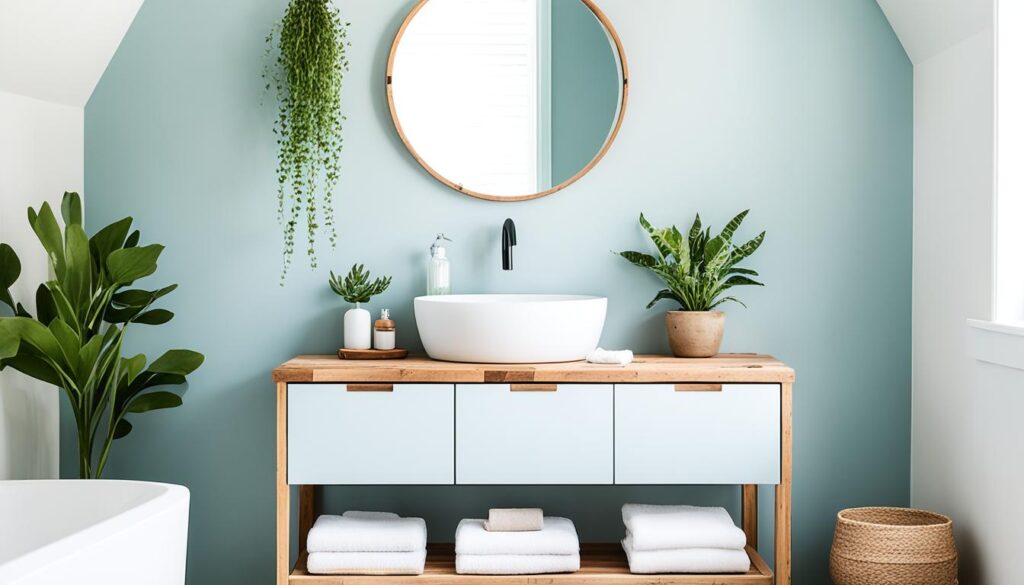
Decorate Your Newly Remodeled Bathroom
Changing your bathroom into a personal sanctuary means choosing decor that shows your style. DIY decor ideas can make the area feel warm and unique. The right accessories and wall art make the ambiance perfect.
DIY Bathroom Decor Ideas
Use natural elements like plants or wooden touches to add beauty. Hang art or photos that make you happy for a beautiful look. Recycle old pieces to make your space special.
Find new ways to use mirrors to spread light and make the bathroom look bigger. This tip is great for small bathrooms.
Storage Solutions to Consider
Staying organized in small bathrooms is important. Use the space above the toilet for shelves or cabinets. Pick furniture that both looks good and keeps things tidy, like a vanity with storage inside.
Think about using drawers or baskets under the sink to keep things neat. It’s possible to mix good looks with useful storage. Adding decorative baskets and trays helps keep things organized while looking great.
| Decor Element | Functionality | Style Aspect |
|---|---|---|
| Wall Art | Adds character | Personalizes space |
| Plants | Improves air quality | Brings life to decor |
| Mirrors | Creates depth | Enhances light |
| Shelves | Maximizes vertical space | Organizes decor items |
| Storage Baskets | De-clutters surfaces | Offers aesthetic appeal |
Using these DIY bathroom decor ideas and smart storage makes your bathroom look and work great. You’ll love your beautiful space every day2425.
Conclusion
Starting a DIY bathroom renovation can be very rewarding. You get to control your space and see your ideas come to life. With careful planning and effort, you can make your bathroom better and more beautiful.
DIY projects can save money and allow for personal touches. But, they need patience and hard work. Paying attention to every step, from choosing the right materials to following safety rules, is key. Looking into guidelines and tips is a good start.
Trying out simple makeover ideas or doing complex jobs can improve your renovating skills. When you look at your finished bathroom, you’ll value the learning, creativity, and effort you put in262728.
FAQ
What are some budget-friendly bathroom remodel tips?
How can I incorporate modern updates into my bathroom design?
What essential tools do I need for a DIY bathroom remodel?
What safety precautions should I take during the demolition phase?
How do I choose the right flooring for my bathroom?
When should I hire a licensed electrician or plumber during my remodel?
What are some easy bathroom makeover ideas I can implement myself?
How can I improve storage in a small bathroom?
Source Links
- https://www.budgetdumpster.com/blog/remodel-bathroom-start-finish
- https://www.instructables.com/DIY-Bathroom-Remodel-How-to-Install-a-Toilet-Vanit/
- https://www.edibleperspective.com/home/2013/6/3/diy-bathroom-renovation.html
- https://www.lowes.com/n/ideas-inspiration/bathroom-remodel-ideas
- https://www.homedepot.com/c/ah/how-to-remodel-a-bathroom/9ba683603be9fa5395fab901422e17f9
- https://www.joanbissdorf.com/blog/2023/2/18/how-to-remodel-a-bathroom-a-step-by-step-to-bathroom-gut-renovation
- https://erinzubotdesign.com/bathroom-remodel-checklist-and-guide/
- https://thathomebirdlife.com/step-by-step-guide-to-choosing-materials-for-a-bathroom-renovation/
- https://www.revive.realestate/post/stages-of-bathroom-renovations-a-step-by-step-guide
- https://www.bathroomremodelingteacher.com/steves-must-have-tools
- https://www.dumpsters.com/blog/how-to-demo-a-bathroom
- https://www.loveandrenovations.com/demo-bathroom/
- https://a-1sewerandsepticservice.com/plumbing-to-consider-before-remodeling-your-bathroom/
- https://absoluteplumbingonline.com/bathroom-remodeling-plumbing-considerations/
- https://www.katoelectrical.com/blog-1/electrical-bathroom-renovation
- https://www.diychatroom.com/threads/bathroom-remodel-new-wiring.648769/
- https://ashleyburk.com/diy-modern-bathroom-remodel-in-under-1k/
- https://www.elevaterealtygroup.com/blog/diy-bathroom-updates/
- https://www.bhg.com/bathroom/flooring/best-bathroom-flooring-options/
- https://www.homedepot.com/c/ai/bathroom-flooring-ideas/9ba683603be9fa5395fab901bc3ef3f5
- https://www.forbes.com/home-improvement/bathroom/best-flooring-for-bathroom/
- https://www.myperpetualproject.com/lets-add-finishing-touches/
- https://www.thebathdr.com/finishing-touches-that-make-a-bathroom-beautiful.php
- https://erinzubotdesign.com/a-diy-bathroom-makeover-the-ensuite-remodel-reveal/
- https://www.angiesroost.com/low-cost-bathroom-remodel/
- https://www.kohlershowers.com/blog/diy-vs-professional-bathroom-remodeling-which-is-a-better-option/
- https://kevinfrancisdesign.com/blogs/news/diy-vs-professional-bathroom-remodeling-what-you-need-to-know
- https://dreamdesignconstruction.com/diy-bathroom-remodel-a-comprehensive-guide/
